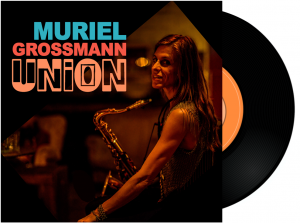Interview in Mallorca Music Magazine from 5th of December 2021
Muriel Grossmann: “Music is always a reflection of what is happening in you”
By Lost Angeles, Photographs by José Luis Luna
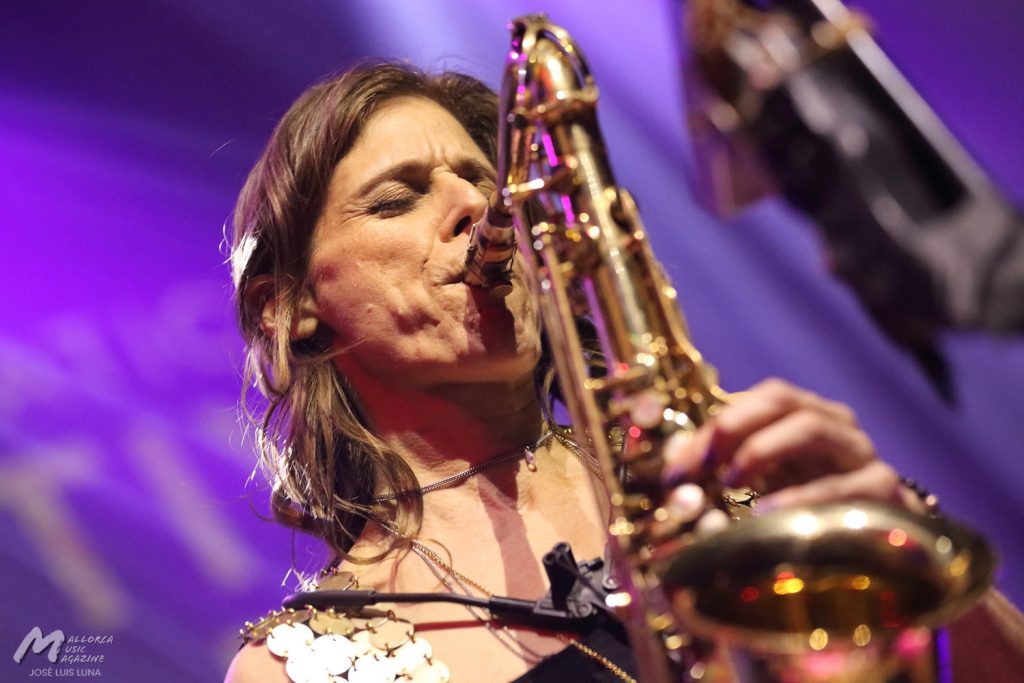
Muriel Grossmann the saxophonist (alto, soprano and tenor) of Austrian origin, born in Paris and resident in Ibiza since 2004, is one of the voices of Spiritual Jazz. Great jazz specialists such as Thom Jurek, from All about Jazz, define her as the successor to John Coltrane. Muriel Grossmann Quartet has presented us with a world premiere of her latest work, called Union, which was published on all digital platforms on November 2 and is now available on vinyl. Union is a miscellany of sounds passing through Alice Coltrane’s most spiritual and intimate jazz, delving into the deeply personal and feminine illuminations from Muriel’s tenor sax and emerging through the evocation of Llorenç Barceló’s Hammond organ, which with Reminiscences of groove and southern soul takes us back in time to times not lived and still longed for.
How were your beginnings in music?
At my parents’ house we listened to music every day. My parents took me a lot to concerts and to the opera when I was little. For me this was an adventure, I was fascinated by large orchestras. My dad had a collection of vinyls, mostly classical music. Music has always been present in my life. When I was 5 years old, I started with the recorder taking classical music lessons. The flute gave me a lot of freedom for improvisation, I remember well those afternoons inventing melodies.
At what point did you switch from recorder and classical music to sax and jazz?
In high school I formed a band with my friends and at that moment I began to be fascinated by the saxophone of one of my classmates. A few years later, in a magical way, I found my first alto sax. The tone was a revelation and I concluded that its sound was broader in the sense of expression and closer to what I wanted to feel. So, I began to investigate the jazz greats of the alto sax: Charlie Parker was a sudden impact that made me deepen in jazz, studying his solos while forming groups to rehearse and play live.
What was the reason you decided to settle in Spain, first in Barcelona and then in Ibiza?
It was an innate desire to want to live in a sunny climate by the sea, perhaps because my parents always went to Italy or Spain on our vacations. I remember dreaming about this idea for years until I was able to turn it into reality. At that time, I was working a lot in Vienna, playing in many different bands, jazz, funk, world music. For me this was wonderful, but over the years, other things started to be important as well. I always wanted to found my own group, compose, record my music … and I imagined living near the sea, somewhere with a lot of sun. All of these things and many more gradually began to push me in this direction. I made the decision, I left everything in Vienna and went to the South. It was an adventure in order to immerse myself in music and the path took me to Barcelona, a city that fascinated me, it’s way of living was so different, relaxed, warm, a lot of street life, carefree … At that time, I visited Ibiza one summer and I stepped in a concert at the Teatro Pereyra. They hired me for the following season and that is how I stayed on the island, fascinated by its nature, its sparkling sea and its multicultural environment.
Have you encountered many difficulties as a woman when carrying out your profession and passion for music?
I have not encountered much difficulty because of being a woman, but I know women who had problems, also women who continue to have these problems, this is something that cannot be explained logically, in the time that we live in, but if we all work together to solve it, I am more than convinced that we are going to achieve a more just world, where diversity and equality will be appreciated and respected. We are in this together, every step we take now is a step towards this future.In my case, I always follow my passion and climb the mountains if they present themselves. I am not afraid, because I know my intention well.
And as a mother?
Being a mother has helped me a lot to focus on my music, music that flows naturally. You find yourself with less time and then you focus more. I thank my children for being on this path with me, and luckily, I have a lot of time for them. My children are always a great inspiration to me.
From a realistic point of view, do you consider that women are currently valued for their quality as professionals or are there still obstacles?
Well, the statistics and the experts say that there is still a lot of difference in the economic sense and how work is valued, but I think the differences are getting smaller and smaller. It is very important for humanity to learn from the perspective of women, to see things from that angle. We have many brilliant women in our history and today there are many artists in all areas. And I’d like to take one step more, see everyone as human, gender is not important, only values and intentions.
Muriel Grossman is a woman committed to her environment, she has been a vegetarian since her early childhood and an environmentalist. Not only as an ideology, but as a way of life. How does your environmental commitment influence your music?
I try to live by the golden agreements: “Think, say and do to others what you want them to think, say and do to you.” We are intrinsically connected with everything and everyone, that is why I think that we must take care of our environment. It is something that everyone can experience, you do not have to be very environmentalist, it is common sense. You just have to leave your garbage in your garden or at your entrance and see if it magically disappears. If not, then you see that you have to start acting! The first thing is to consume less and just enough and buy things aware of their environmental impact and recycle and live consciously. I always told my children when they were little: “There is only one planet Earth and this is our home, the land of the entire great family of living beings and we have to take care of it.” When composing, I use my concerns and reflections. The Album Earth Tones (2015) is an example of composing for our common home, Mother Earth. An album that I have composed with the intention of making us more aware of her needs.
Your latest work Union, which you have recently presented at the Jazz Point Ibiza 2021, is a return to the essence of the most spiritual jazz and of evocation. Do you think that the current world situation has influenced this return or transformation towards spirituality?
Music is always a reflection of what is happening in you, in connection with the environment and the world. I think that music can help people see things differently, it can inspire and it can help people survive in challenging situations. For me it is very important to have a good intention making music, I always wanted to contribute something positive, something that makes us stronger and more vital, something that encourages us to look within ourselves, to find what really pushes us to live. My last two albums, Quiet Earth (2020) and Union (2021), which have been released in these troubled times, are a declaration of good intentions, they are the continuation of a thought and state of mind that has been developing since the album Birth Of The Mystery (2010). Union (2021) is a continuity of reflections on myself and my closest environment, each album represents something that I wanted to do musically at that time. My music became more spiritual with the album Earth Tones (2015) and I think that direction has taken shape with the album Golden Rule (2018). This historical moment has been crucial to find both the sound of the group, and to express it individually.
Could you tell me a bit about the creative process of the Muriel Grossmann Quartet, both in Union and in general?
The album Union was a bit different from the other albums in the fact that it was not planned for release. I wanted to record the band live, but it was impossible, so while we were touring Mallorca, I arranged a date at a local studio and we basically recorded the set that we played live. I always loved this recording, but I thought it would stick with the rest of my files. The impact of the world situation made me decide to publish the recording. On other albums the process of making the album is always similar. I have many works composed as a unit of different pieces, which are linked to each other, as a suite. Sometimes I write the parts of each of the instruments directly on paper, other times I use the piano to compose, many times I do everything with the saxophone. It is a matter of listening to the melodies, the songs and putting it in the context of the group that I have and the instruments that I am going to use. More or less I always know when I’m going to play soprano, alto or tenor. Then we get together to review the songs, we try different arrangements, ways of interpreting and when we are satisfied, we start recording. A process that always continues. Likewise, when I do the compositions, I never sit on the piano and say “now I am going to compose”, it is something that just happens, like a call. When it comes to the names of the albums or songs, it is the same, they come out naturally according to the reflection and intention that I have. The choice of the name Union expresses that we are all always united and what really connects us is not the global situation, but our deepest values (love, respect, generosity, patience …), which are the virtues that we most appreciate and value if presented to us. In the recording you can listen to my current quartet which is made up of the great guitarist Radomir Milojkovic, with whom I have worked hand in hand for almost 20 years, the fantastic Llorenç Barceló on the Hammond organ and “the groove machine” Uros Stamenkovic. I am very fortunate to have by my side these fantastic musicians who always respect and support me. We have been playing and working together for so many years that we have been able to create our own sound, the essence of our group that is expressed in our music.
How is the reception at the different festivals where you have presented it?
Our tours and concerts weren’t always related to the release of a new album. The last tour before the pandemic was through northern European countries. Now, little by little, we are recovering the dates of the lost concerts and tours. In January 2022 we have concerts in France, Belgium, Austria, Holland… I hope that when the current situation improves we will go back to giving international concerts and tours. They await us, especially in England and the United States.
Your album covers have caught my attention. They are very well selected and visually show what we are going to find between the vinyl grooves. Who is or who are the artists to whom you entrust this important part, which is the image of your work?
I try to cover various areas within the album production. My album covers are no exception. It is when I release music through my record label that I have all the independence I need to create freely, and I always use the paintings made by myself and my children. We like to paint a lot and it seemed like a very good idea because they represent the music of the albums well. Later, when I release albums with other labels like RR GEMS Records or Jazzman Records, they respect our ideas about how we want to represent our music very well, they advise us and give us good ideas and in the end we always come to a good conclusion all together. When we release the records in vinyl format for RR GEMS Records, they prefer to use photos for the covers. The most important thing is that we are all satisfied.
What projects are you currently involved in?
I am playing in different projects. One is from the early sixties, soul jazz, one is from music of Lester Young and I’m also playing a lot with the trio and duo. I am participating with the Big Band Ciutat d’Eivissa and I also play the baritone with the band of the trombonist and arranger Vicent Tur, which is called “Speaking of Sounds”, where we are playing original arrangements. At the moment we are preparing some videos of some of my tunes and we are working on the next album that will come out next year.
How do you see the current jazz scene worldwide? And the local Balearic scene? Could you highlight an artist?
The jazz scene was very diverse and vibrant at all times in history, and the word jazz represents music in a very broad sense. Only New York has like 3 or 4 different jazz scenes, one that is more standard, another more avant-garde, another that is very much about using elements of current music like hip hop, and there are others that I can’t even describe, but like everything, each of these scenes are divided into several subgroups. Apart from New York, in the United States there are places like Los Angeles, New Orleans or Chicago that also have a powerful jazz scene. Historically Philadelphia and Detroit too, many great jazz musicians are from precisely these places. And in Europe, another style of jazz is played, colloquially called European Jazz. Berlin and Paris continue as the main scenes of the euro-jazz, without forgetting the Nordic jazz scene that has also left its mark.
At the local level, on the Balearic Islands we always had good musicians or bands like the pianists Marco Mezquida or Agustí Fernández. Now there are also many good musicians who conquer the world jazz scene such as the double bass player Pere Bujosa, the trumpet player Pere Navarro, the talented guitarist Omar Alcaide, the young talent Andrés Coll on vibraphone and many more. The institutions that deal with culture also help a lot. The dedication, persistence and faith of people like Pep Tur, Ibiza culture councilor, Xavier Barceló and the team of the Institut d’Estudis Balearics, Miquel Costa, the culture director of the Ibiza Council and many more. Then there are places where jazz is played, there are festivals, radio programs, portals like yours, dedicated to jazz, there are some excellent photographers like José Luis Luna or Ferrán Pereyra who don’t lose a beat in the concerts taking some incredible photos, some of them I have used for covers or inside of my records. Jazz is a genre that has a huge following and also especially vinyl listeners who are very appreciative and enthusiastic about it.
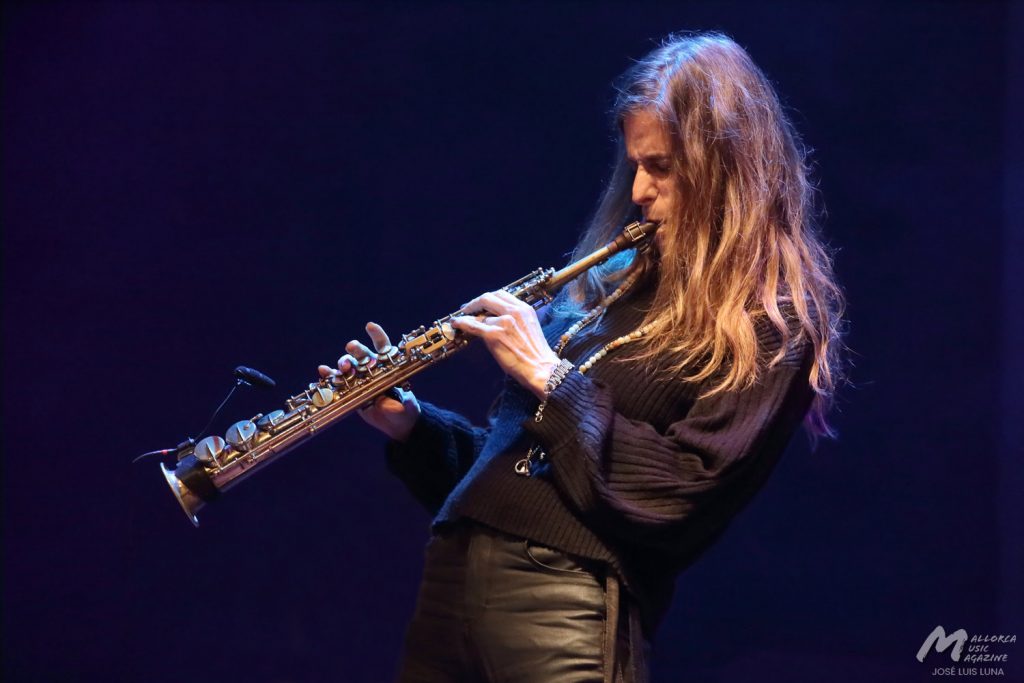
We know that John Coltrane is for you one of the most important musicians that humanity has ever known. Besides him, what other musicians have influenced you?
Besides John Coltrane there are many musicians who have inspired me: Ornette Coleman, Alice Coltrane, Lester Young, Illinois Jacquet, Charlie Parker, Sonny Rollins, Cannonball Adderley, Pharoah Sanders, Tony Malaby, Bach… and the list goes on forever.
Can you name me 10 albums that have marked you on a personal level?
There are a lot of good records. It is very difficult to choose five, ten or twenty records, especially knowing that we always go through different moments in life where we listen to one thing more than another, or we just discover new things. But I will make a list where I am going to choose some albums that were and continue to be essential for me:
A Love Supreme — John Coltrane
Journey in Satchidananda — Alice Coltrane
Complete Savoy Masters — Charlie Parker
Kind Of Blue — Miles Davis
Something Else – Cannonball Adderley
A Night At The Village Vanguard — Sonny Rollins
The Shape Of Jazz To Come — Ornette Coleman
Out To Lunch — Eric Dolphy
Lester Young Trio — Lester Young
Go Power — Illinois Jacquet
Hejira — Joni Mitchell
Electric Ladyland — Jimi Hendrix
Oumou — Oumou Sangare
Faso Denou – Farafina
by Lost Angeles, Psycho Dj. Lost in a sound maze that I don’t want to get out of …
Jose Luis Luna, Photographer of the Spanish and local music scene since 2010. A contributor to national festivals and magazines, he has exhibited in various Spanish cities and abroad. Photographer in Mallorca Music Magazine.
⇐ back to news page

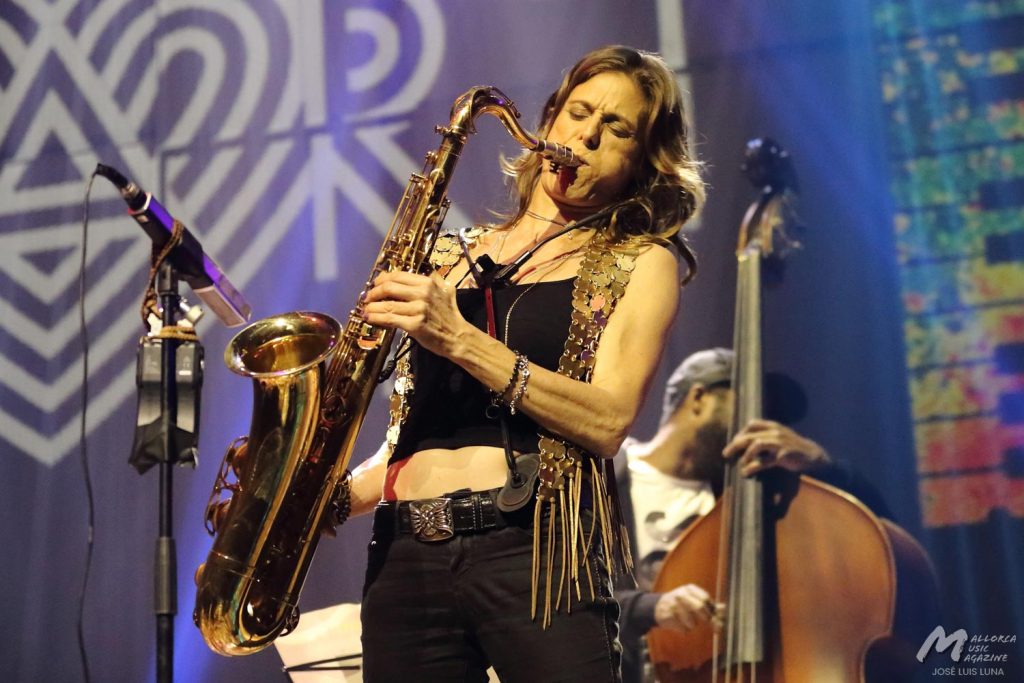
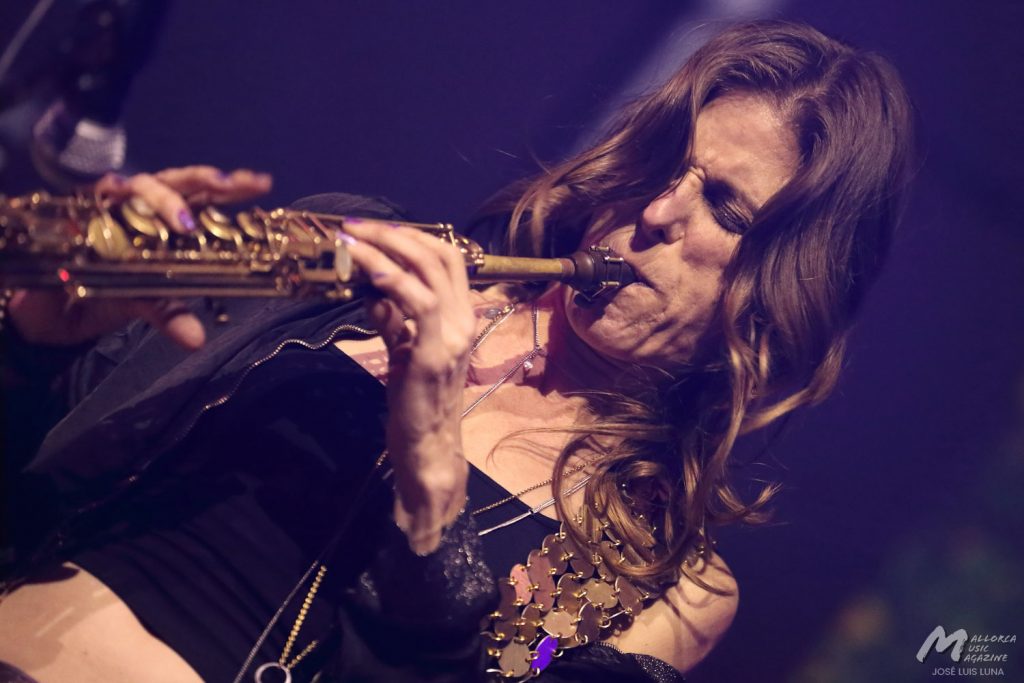

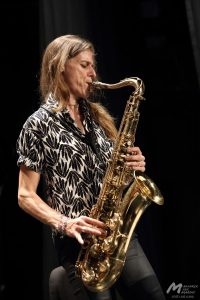 <
<